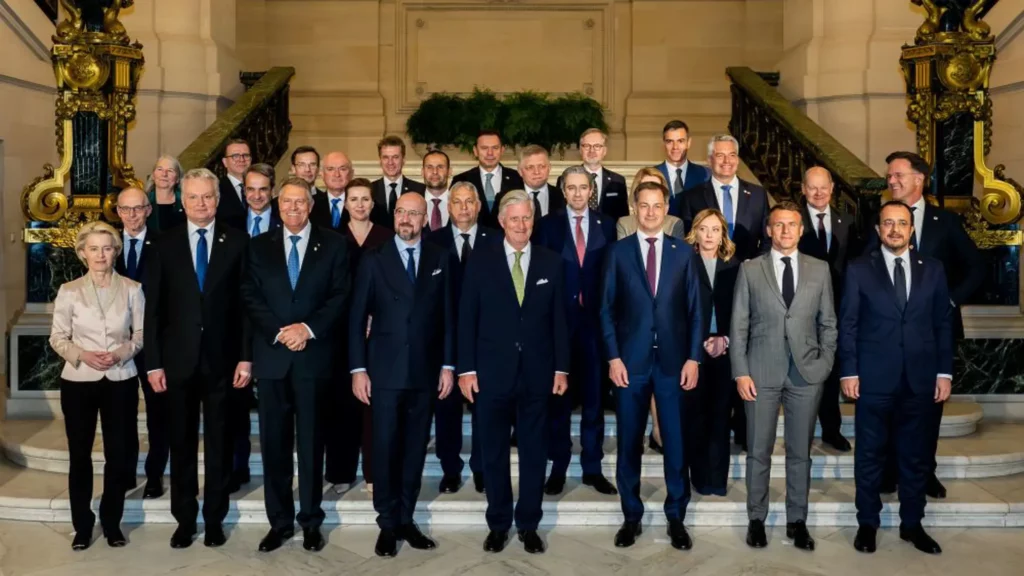The two-day summit of the European Council this week focused among others on Ukraine and the Middle East amid growing challenges in providing military assistance to Ukraine against Russia’s war of aggression and de-escalating the wider Mid-East conflict.
In its conclusions, the Council reiterated its “full unwavering support to Ukraine, its people and its independence, sovereignty and territorial integrity within its internationally recognised borders”. It condemned Russia’s continued air and missile attacks against Ukraine’s civilians and critical infrastructure, including the recent intensified targeting of the energy sector.
But the EU admitted that it is not doing enough to provide Ukraine with much needed military assistance. The Council underlined the need to “urgently provide air defence to Ukraine and to speed up and intensify the delivery of all the necessary military assistance, including artillery ammunition and missiles”.
The promise of more military aid comes with a caveat as it will be provided “in full respect of the security and defence policy of certain Member States and taking into account the security and defence interests of all Member States”. EU promised to supply Ukraine with 1 million artillery shells but delivered much less and Ukraine is running out of ammunition.
Furthermore, Ukraine’s air defence does not have the capacity to intercept all Russian drones and missiles that threaten to make its cities unlivable by destroying energy plants and water supply system. Ukraine’s president Volodymyr Zelenskyi is desperately appealing to the EU and the US to show the same unity and support as it showed when Iran attacked Israel with hundreds of drones and missiles in a few hours.
The unprecedented Iranian attack was effectively intercepted by Israel’s multi-layered air defense system in cooperation with an alliance of the US, the UK, France, and moderate Arab Sunni countries. Ukraine asked NATO from the very start of Russia’s invasion to establish a no-fly zone over its skies but was turned down as it could risk a direct confrontation between NATO and Russia.
Ukraine has also been turned down by Israel when it appealed to provide it with air defense systems. According to a report by Politico, virtually any other country in the world would have been incapable of coping with the Iranian attack. Ukraine, armed with a small number of Patriot missiles, has been unable to protect its energy infrastructure from the much smaller Russian missile and drone attacks.
This could, however, change in view of the close cooperation between Russia and Iran, which is supplying Russia with drones and possibly also missiles. Some EU member states signed last year contracts for the purchase of the Israeli Arrow and David’s Sling air defence systems and might be willing to “lease” them to Ukraine who needs them more.
According to the Council conclusions, the EU will also take further restrictive measures against Iran, notably in relation to unmanned aerial vehicles (UAVs) and missiles.
The EU might also impose sanctions against the Iranian Revolutionary Guard, according to EU’s foreign policy chief Josep Borrell. For the EU to proceed on this, it needs a decision by a member state related to a case of terrorist activities in which the Revolutionary Guard of Iran has been involved, he said.
The European Council condemned the Iranian attack on Israel and reiterated “its full solidarity with the people of Israel and commitment to Israel’s security and to regional stability”. The Council calls on Iran and its proxies to cease all attacks and urges all parties to exercise the utmost restraint and to refrain from any action that may increase tensions in the region.
The support for Israel, following the Iranian attack, can easily erode again as happened after the 7 October attack if there is no end to the Israel-Hamas war and an improvement in the humanitarian situation in Gaza.
The Council reiterated its commitment to work for reaching an immediate ceasefire and the unconditional release of all hostages, as well as providing full, rapid, safe and unhindered access to humanitarian aid at scale for Palestinians in need.
Israel claims that it has doubled or even tripled the number of aid trucks into the Gaza Strip and increased the access points for aid. The EU believes that these still are promises. In a joint statement, High Representative Borrell and the Commissioner for Crisis Management, Janez Lenarčič, wrote that Israel’s commitments must be followed by meaningful actions as a matter of priority.
Before the Iranian attack, the biggest spill-over risk of the Israel – Hamas war was in Lebanon, where Hezbollah has waged a low-intensity war against the north of Israel in solidarity with Hamas. The risk for a full-scale war, encouraged by Iran, cannot be excluded as the hostilities have escalated lately.
Until now, the EU has not played any major role in finding a political solution to the conflict there. The Council conclusions state that the EU is ready to work with all partners to avoid further escalation of tensions in the region, notably in Lebanon. The Council called on all parties to implement the UNSC Resolution 1701 from 2006, which requires Hezbollah to withdraw from the border region.
The two top priorities are the fate of the remaining Israeli hostages kept by Hamas and the humanitarian situation for the Palestinians in Gaza, explained Peter Stano, lead spokesperson for EU’s foreign policy, at the Commission’s press conference yesterday. Both issues will be discussed at the regular foreign affairs council meeting on Monday.
M. Apelblat
The Brussels Times

